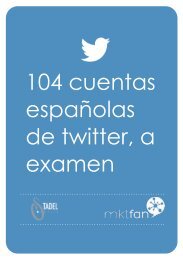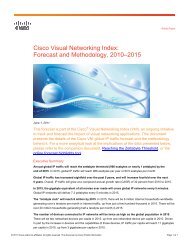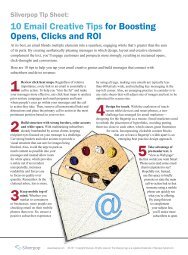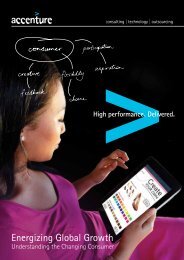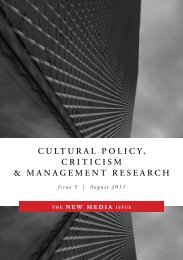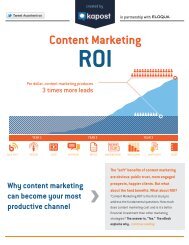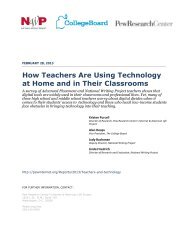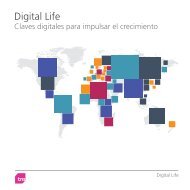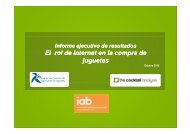Open Innovation 2.0 Yearbook 2013 - European Commission - Europa
Open Innovation 2.0 Yearbook 2013 - European Commission - Europa
Open Innovation 2.0 Yearbook 2013 - European Commission - Europa
You also want an ePaper? Increase the reach of your titles
YUMPU automatically turns print PDFs into web optimized ePapers that Google loves.
92 O P E N I N N O V A T I O N 2 0 1 3<br />
prioritised. Recommendations can be proposed<br />
and discussed in terms of suitability<br />
and practical implementation. Finland<br />
was the first country to organise a round<br />
table with the NCP (in 2005). This process,<br />
documented in the report Five Steps for Finland’s<br />
Future, contributed to a knowledgeminded<br />
innovation programme inspired by<br />
its recommendations. Since then, NCP round<br />
tables have been held in Morocco, Serbia,<br />
Malaysia and Austria, and a bilateral round<br />
table between France and Germany is currently<br />
running.<br />
• Use ACSI camps and regional SI Labs to engage<br />
citizens, researchers and experts to work collaboratively<br />
on reframing issues and creating<br />
early prototypes.<br />
ACSI is an action-learning camp addressing<br />
societal concerns in a new and highly effective<br />
manner: it initiates a 12-month process<br />
empowering people and organisations to<br />
think and act in concert, applying innovation<br />
skills and mindsets to address challenging<br />
real-life issues. Participants create a shared<br />
understanding of how opportunities for<br />
societal innovation emerge and how to use<br />
them constructively. Methodologically, ACSI<br />
acts through the Knowledge Triangle, combining<br />
research, education and innovative<br />
practice to develop prototypes for systemic<br />
societal renewal. The goal is to break new<br />
ground and transcend traditional (social<br />
and societal) borders to create new ways of<br />
thinking about the issues addressed. Integrating<br />
students, researchers, innovators,<br />
artists, and working life experts from various<br />
disciplines and many countries creates<br />
synergies and multi-perspectives leading<br />
to new ideas. The core of ACSI is an 8-day<br />
camp that has been organised three times<br />
in Finland, and will move to Sweden this<br />
year. Short forms called Societal <strong>Innovation</strong><br />
Labs (SI Labs) are being prototyped<br />
in South Africa and other locations. These<br />
3- and 4-day labs focus on developing the<br />
mindset and skills needed for pursuing systemic<br />
change.<br />
• Make use of innovation-enabling environments<br />
such as future centres and Living Labs<br />
to directly involve key stakeholders in addressing<br />
issues, prototyping promising solutions, and<br />
testing them in practice.<br />
These innovation-enabling environments<br />
are facilitated working and meeting environments<br />
that help organisations to prepare<br />
for the future in a proactive, collaborative<br />
and systematic way. They provide facilitated<br />
high-tech/high-touch environments to create<br />
and apply knowledge, develop practical<br />
innovations, bring government in closer<br />
contact with citizens and connect end-users<br />
with industry. Their core business is engaging<br />
stakeholders in developing innovative<br />
solutions to challenging business, organisational<br />
or societal problems. People are<br />
central to this solution-seeking process.<br />
Future centres typically deal with the development<br />
of new visions, policies, products<br />
and services, translating strategic goals and<br />
intentions into actionable plans, and creating<br />
breakthroughs in stuck situations. They<br />
stimulate cooperation within and between<br />
organisations, enhance open innovation and<br />
participative design through collaboration<br />
with citizens, end-users, and stakeholders,<br />
and provide process space to test prototypes<br />
in practice.<br />
Such a process could help regions to move decisively<br />
from strategic plans to strategic action. It<br />
would create early exemplars of successful practice,<br />
using research and knowledge to tackle societal<br />
challenges at the regional and local level, and<br />
contribute to helping Horizon 2020’s three-pillar<br />
focus to achieve its promise of strong societal<br />
impact.<br />
During the EPP (<strong>European</strong> People’s Party Group)/CoR<br />
<strong>Open</strong> Days seminar on the importance of innovative<br />
regions and cities for territorial development,<br />
attended by more than 150 participants in October<br />
2012, presentations described relevant factors for<br />
maintaining open innovative regions. Michael Schneider,<br />
President of the EPP Group of the Committee<br />
of the Regions, set the tone when he stated that ‘to<br />
reach the Europe 2020 targets, increasing bottomup<br />
collaboration is a must … Piloting and experimenting,<br />
entrepreneurial discovery and societal<br />
innovation all have their role to play’. He concluded<br />
by saying that ‘further policy development must be<br />
based on shared ownership and integrating political<br />
decision-makers’. Speakers emphasised that Europe<br />
needs pioneering regions and cities. Entrepreneurial<br />
spirit, open innovation, and cooperation between different<br />
sectors are vitally important to achieving the<br />
targets of Europe’s 2020 strategy. The NCP ideas<br />
resonate strongly with these sentiments.<br />
The seminar pushed the boundaries of traditional<br />
gatherings by encouraging collaborative participation<br />
through a ‘Meshmoon’ virtual world, developed<br />
for use in Finland’s Energising Urban Ecosystems



